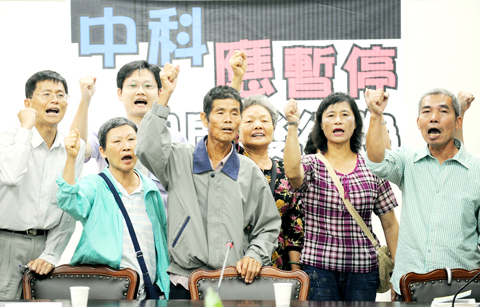Farming activists and environmentalists celebrated after the Taipei High Administrative Court yesterday ordered the Central Taiwan Science Park to halt all expansion activities pending a ruling on two ongoing lawsuits.
The science park’s two latest expansion projects — one in Taichung County’s Houli Township (后里) and the other in Changhua County’s Erlin Township (二林) — have sparked controversy in recent years as farmers oppose government expropriation of their farmlands to make way for the science park.
To stop the seizure of their farmlands in Siangsihliao (相思寮), Erlin, activists, environmentalists and local farmers filed three lawsuits with the administrative court — to void the science park’s construction permit for the Erlin project, to nullify the results of an environmental impact assessment, and to order the science park to stop all activities related to the expansion project until rulings on the two prior issues are handed down.

PHOTO: LO PEI-DER, TAIPEI TIMES
The court yesterday ruled in favor of the activists and suspended all expansion activities.
“The court ruling stressed a very important point,” Taiwan Rural Front spokeswoman Tsai Pei-hui (蔡培慧) told a news conference at the legislature. “It said ‘economic development and environmental protection are equally important.’”
“This is a very crucial ruling, and we’re now at a very crucial moment: From now on, economic development should no longer take precedence over the environment, as people used to think decades ago,” she said.
The court ruled that since the destruction of farmlands could cause irreversible damage, it was ordering a halt to construction.
Upon hearing the news, several Siangsihliao farmers rushed to Taipei to attend the press conference.
“We may be just illiterate farmers who are not very smart, but we’ve faithfully followed the whole legal process, and we hope the government will also abide by the court ruling,” farmer Chen Huang Yuan (陳黃媛) said.
Another Siangsihliao resident, Yang Yu-chou (楊玉洲), also urged the government to comply with the ruling and avoid wasting more taxpayers’ money on the controversial development project.
Although happy with the ruling, Thomas Chan (詹順貴), a member of the Taiwan Rural Front and a lawyer, voiced his worries that the government may try to twist it when interpreting the ruling.
“Of course the ruling is legally binding, and the project should be suspended right away even if the [science park] administration would like to appeal it,” Chan said. “But I’m still not very confident because of what happened to [the Houli project].”
Last year, the administrative court revoked the environmental impact assessment on the science park’s Houli expansion project. However, the Environmental Protection Administration (EPA) insisted that construction should continue, saying that since construction started based on a previously completed and valid environmental impact assessment result, it was not in violation of the Environmental Impact Assessment Act (環境影響評估法), which mandates that such development projects can only begin after completing an environmental impact assessment.
“I’m not sure what’s going to happen, but this is still something to celebrate,” Chan said.

NATIONAL SECURITY THREAT: An official said that Guan Guan’s comments had gone beyond the threshold of free speech, as she advocated for the destruction of the ROC China-born media influencer Guan Guan’s (關關) residency permit has been revoked for repeatedly posting pro-China content that threatens national security, the National Immigration Agency said yesterday. Guan Guan has said many controversial things in her videos posted to Douyin (抖音), including “the red flag will soon be painted all over Taiwan” and “Taiwan is an inseparable part of China,” while expressing hope for expedited “reunification.” The agency received multiple reports alleging that Guan Guan had advocated for armed reunification last year. After investigating, the agency last month issued a notice requiring her to appear and account for her actions. Guan Guan appeared as required,

DAREDEVIL: Honnold said it had always been a dream of his to climb Taipei 101, while a Netflix producer said the skyscraper was ‘a real icon of this country’ US climber Alex Honnold yesterday took on Taiwan’s tallest building, becoming the first person to scale Taipei 101 without a rope, harness or safety net. Hundreds of spectators gathered at the base of the 101-story skyscraper to watch Honnold, 40, embark on his daredevil feat, which was also broadcast live on Netflix. Dressed in a red T-shirt and yellow custom-made climbing shoes, Honnold swiftly moved up the southeast face of the glass and steel building. At one point, he stepped onto a platform midway up to wave down at fans and onlookers who were taking photos. People watching from inside

A Vietnamese migrant worker yesterday won NT$12 million (US$379,627) on a Lunar New Year scratch card in Kaohsiung as part of Taiwan Lottery Co’s (台灣彩券) “NT$12 Million Grand Fortune” (1200萬大吉利) game. The man was the first top-prize winner of the new game launched on Jan. 6 to mark the Lunar New Year. Three Vietnamese migrant workers visited a Taiwan Lottery shop on Xinyue Street in Kaohsiung’s Gangshan District (崗山), a store representative said. The player bought multiple tickets and, after winning nothing, held the final lottery ticket in one hand and rubbed the store’s statue of the Maitreya Buddha’s belly with the other,

‘NATO-PLUS’: ‘Our strategic partners in the Indo-Pacific are facing increasing aggression by the Chinese Communist Party,’ US Representative Rob Wittman said The US House of Representatives on Monday released its version of the Consolidated Appropriations Act, which includes US$1.15 billion to support security cooperation with Taiwan. The omnibus act, covering US$1.2 trillion of spending, allocates US$1 billion for the Taiwan Security Cooperation Initiative, as well as US$150 million for the replacement of defense articles and reimbursement of defense services provided to Taiwan. The fund allocations were based on the US National Defense Authorization Act for fiscal 2026 that was passed by the US Congress last month and authorized up to US$1 billion to the US Defense Security Cooperation Agency in support of the